.
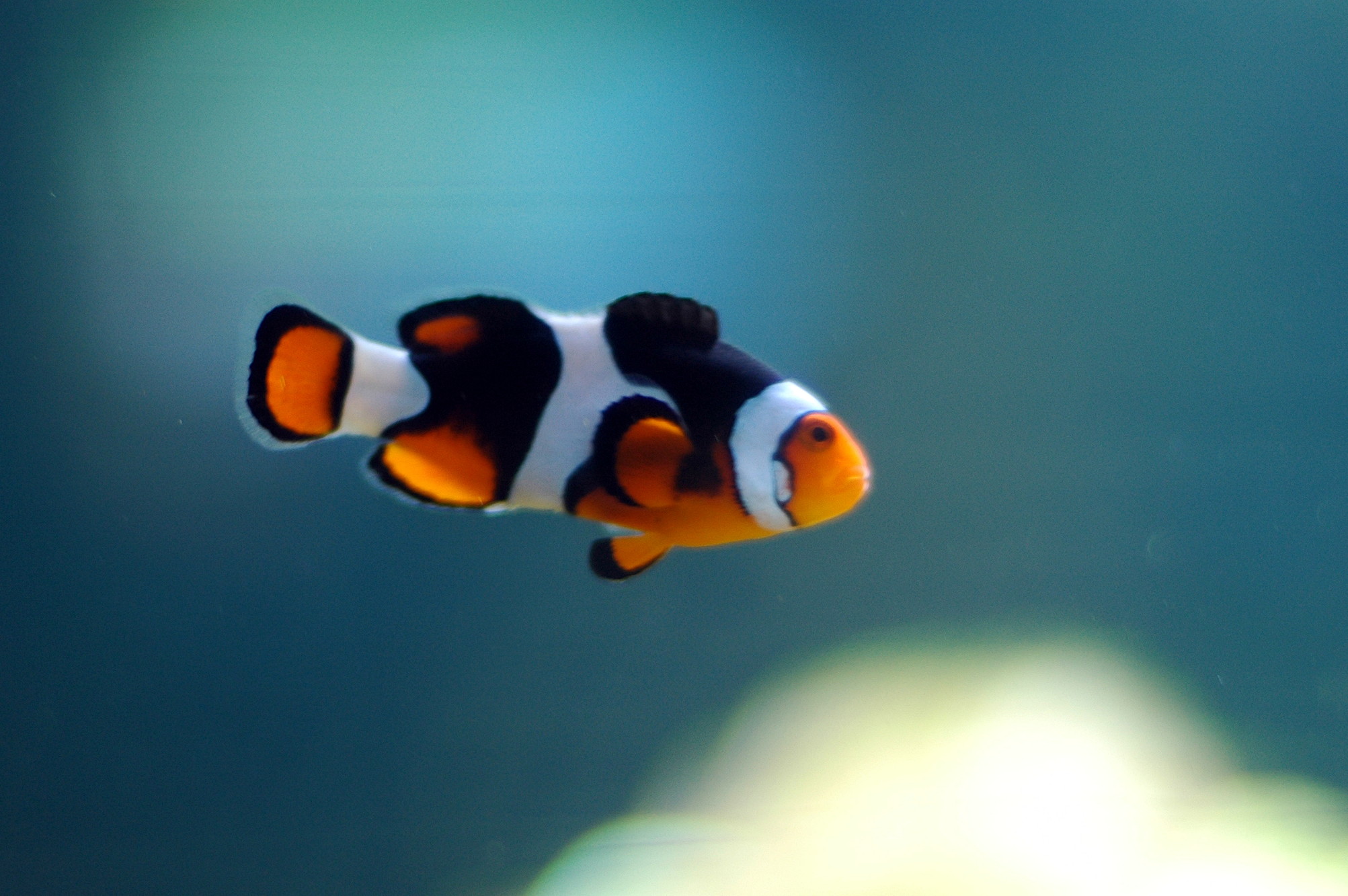
Clownfish (Amphiprion ocellaris), swimming: photo by Jeff Kubina 27 December 2006
Abstract
Ocean acidification is predicted to affect marine ecosystems in many ways, including modification of fish behaviour. Previous studies have identified effects of CO2-enriched conditions on the sensory behaviour of fishes, including the loss of natural responses to odours resulting in ecologically deleterious decisions. Many fishes also rely on hearing for orientation, habitat selection, predator avoidance and communication. We used an auditory choice chamber to study the influence of CO2-enriched conditions on directional responses of juvenile clownfish (Amphiprion percula) to daytime reef noise. Rearing and test conditions were based on Intergovernmental Panel on Climate Change predictions for the twenty-first century: current-day ambient, 600, 700 and 900 µatm pCO2. Juveniles from ambient CO2-conditions significantly avoided the reef noise, as expected, but this behaviour was absent in juveniles from CO2-enriched conditions. This study provides, to our knowledge, the first evidence that ocean acidification affects the auditory response of fishes, with potentially detrimental impacts on early survival.
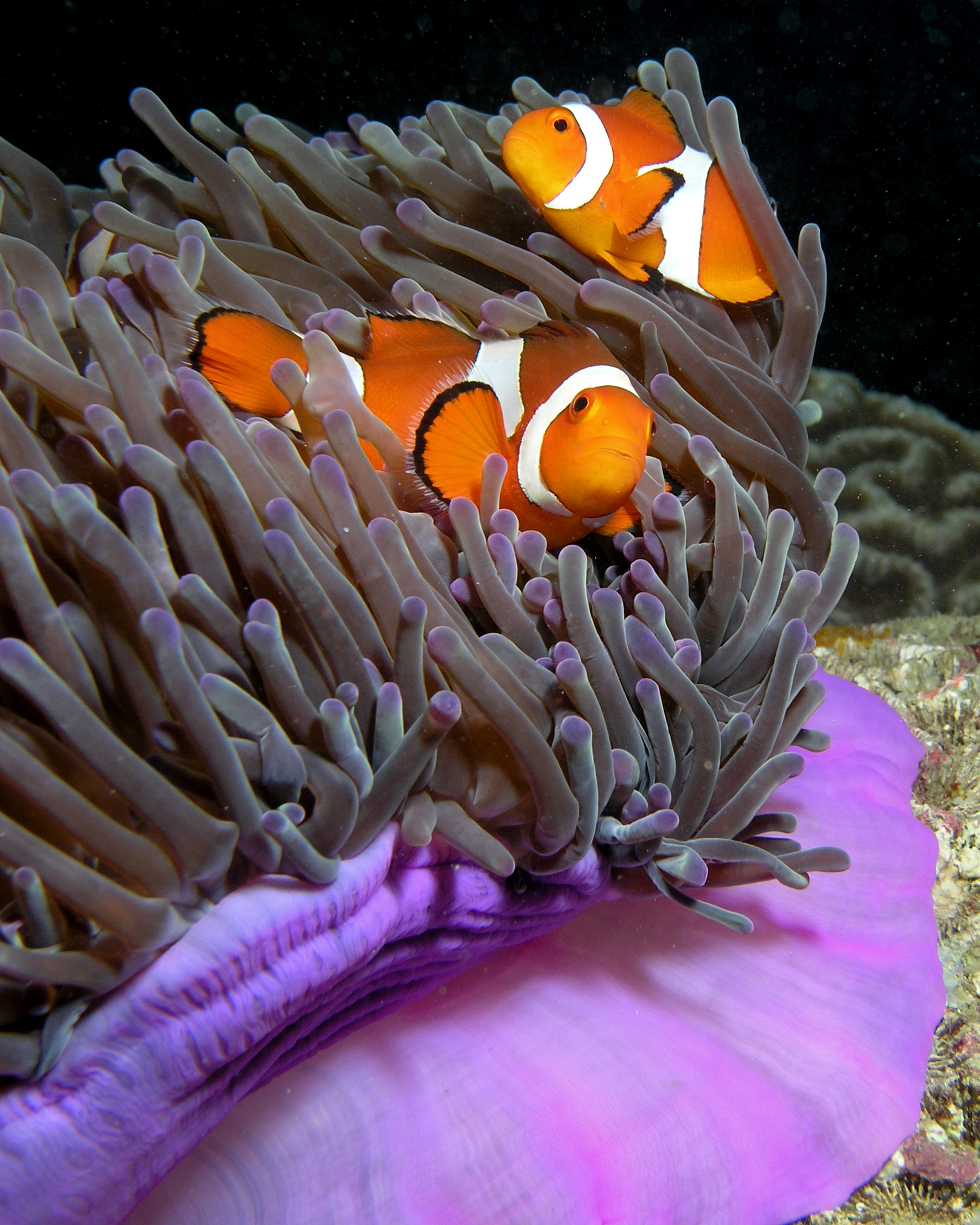
Purple anemone (Heteractis magnifica) and resident Anemonefish [Clownfish] (Amphiprion ocellaris), East Timor: photo by Nick Hobgood, 28 May 2005
Introduction
Since the Industrial Revolution, approximately 142 billion tonnes of anthropogenic CO2 has been absorbed by the oceans, resulting in ocean acidification at a rate far faster than any time in the last 650,000 years, and causing the average pH of the ocean to drop by 0.1 units. If global emissions continue on the current trajectory, atmospheric CO2, currently at 390 ppm, is predicted to reach 730–1020 ppm by 2100, causing a further drop in ocean pH of 0.3–0.4 units. Acidified conditions compromise the ability of marine calcifiers to build skeletons and shells, but the combined influences on non-calcifiers including fishes are far less understood. Determining the effects of acidification on crucial behavioural responses in marine species is essential for predicting the ecosystem and societal effects of ocean acidification in the twenty-first century.
Following a planktonic larval phase in the open ocean, juvenile coral reef fishes use a suite of sensory capabilities to detect, orient towards, and discriminate between potential settlement sites. Olfactory cues provide valuable information for settling fishes, but recent work has demonstrated that fishes reared in CO2-enriched conditions lose their ability to distinguish odours, preferring the odours of inappropriate habitats and failing to avoid predator cues. Auditory cues from coral reefs, dominated by the clicks and chirps of resident crustaceans and fishes, are also important in guiding directional behaviour and habitat preferences, and nocturnal reef sounds promote settlement while daytime predator-rich noise is avoided. Central to fish hearing is the inner ear, which includes dense carbonate otoliths (earbones). Otolith growth can be altered by elevated-CO2 conditions during development, suggesting that acidification could also affect the auditory response. A key question that emerges from recent work is whether elevated-CO2 conditions deleteriously affect the auditory response of reef fishes in their early life-history stages, confounding the effects of ocean acidification on other sensory modalities and further eroding orientation, habitat selection and predator avoidance behaviour.
Here, we used information from existing electrophysiological assessment of hearing in juvenile clownfish to set audible and naturally relevant levels of sound for playback in an auditory choice chamber. We studied the influence of CO2-enriched rearing and test conditions on the directional response of recently settled juvenile Amphiprion percula (orange clownfish, 17–20 days post-hatching) to a daytime recording of reef noise that was avoided by larvae in a previous experiment. The CO2-conditions of our rearing and test environments were current-day ambient (∼390 µatm), and elevated-CO2 treatments (approx. 600, 700 and 900 µatm), consistent with the range of Intergovernmental Panel on Climate Change predictions for CO2 concentrations at the end of the twenty-first century.
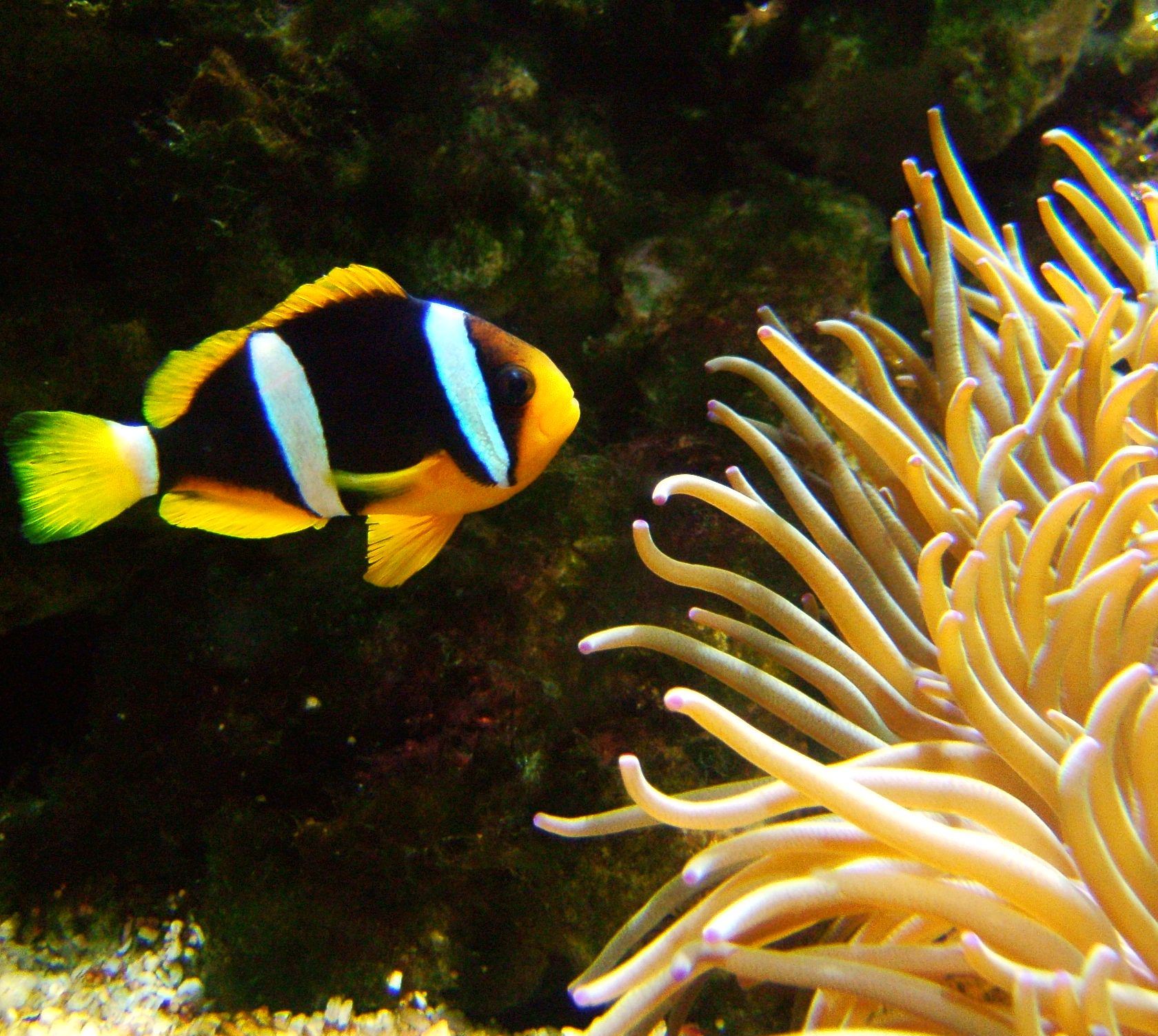
Results
Recently settled juvenile A. percula reared and tested in ambient CO2-conditions (∼390 µatm) significantly avoided the predator-rich daytime recording of a reef during playback (one-sample t-test, arcsine square-root transformed data, H0 = 0.5, t29 = −4.6, p < 0.001), spending, on average, 73 per cent of the time in the half of the chamber away from the speaker. By contrast, no avoidance behaviour was detected in larvae reared and tested in CO2-enriched conditions (600 µatm: t12 = 0.8, p = 0.43; 700 µatm: t20 = 1.8, p = 0.08; 900 µatm: t29 = 1.7, p = 0.10), with groups spending between 58 and 64 per cent of the time near to the speaker. A significant effect of CO2 treatment between the groups was detected, with the response in all of the elevated CO2 groups being significantly different to the ambient group (ANOVA: F3,90 = 7.3, p < 0.001; Tukey LSD test, p < 0.01: ambient ≠ (600, 700, 900 µatm)). No deviation from random movement was observed in the trials without playback sound: the mean proportion of time spent by each group towards the speaker ranged from 0.49 to 0.57 (one-sample t-tests, arcsine square-root transformed data, H0 = 0.5, n = 13–30, p > 0.37 throughout).

Twoband Anemonefish (Amphiprion bicinctus), Red Sea: photo by Albert Kok, 18 August 2008
Discussion
We found a change in the directional response of recently settled juvenile A. percula to a predator-rich daytime reef recording, if reared in CO2-conditions predicted for the shallow ocean later this century. Daytime reef noise is usually avoided by free-swimming early-stage reef fishes and, as expected, clownfish reared in ambient CO2-conditions avoided our playback, but this response was absent in larvae reared at 600 µatm CO2 or higher. On the current CO2 emissions trajectory, the average concentration of CO2 in the atmosphere and surface waters of the ocean is predicted to exceed 500 µatm by mid-century and could approach 1000 µatm by 2100, suggesting that ocean acidification could compromise auditory behaviours crucial for survival.
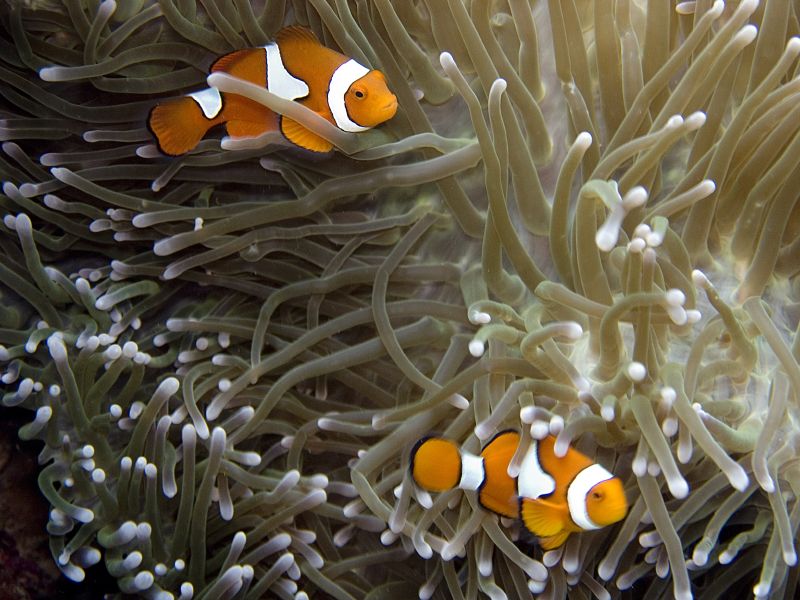
Clown Anemonefish (Amphiprion percula), New Guinea: photo by Jan Messersmith, 28 May 2005
Previous studies have demonstrated that A. percula reared in CO2-enriched conditions lose their innate avoidance response to olfactory predator cues, becoming attracted to the scent of predators and unable to distinguish predators from non-predators in olfactory y-mazes. Our study demonstrates that the effects of CO2-enrichment on sensory behaviour are not limited to sensory modalities with external sensory receptors such as olfaction, but that a behavioural response from a sensory system with internal receptors is also affected, suggesting that responses to auditory stimuli are unlikely to compensate for the documented loss of olfactory capability.
Clown anemonefish (Amphiprion ocellaris), "normal" orange range (right) and melanissic (blackish) variant (left): photo by FireFly, 20 June 2007
Understanding the mechanisms by which sensory and behavioural responses to environmental cues become modified by exposure to CO2-enriched conditions is essential for predicting the detrimental impact of ocean acidification on fish behaviour. A previous study found increased growth of otoliths (earbones) in fishes reared in highly CO2-enriched concentrations, whereas at the less severe levels of CO2-enrichment used in this study, we did not see modification of otolith growth that could be attributed to the CO2 treatment (analysis of otolith morphology in the electronic supplementary material). This is consistent with another study, which found no effects on clownfish otoliths up to approximately 1050 µatm CO2. Likewise, no obvious modification was detected in the morphology of the nasal cavity of larval clownfish in an olfaction study. Combined, these results point to disruption of behaviour either through deterioration of neural transmission, perhaps owing to modified internal acid-base balance, or through compromised processing of sensory information. Alternatively, it is possible that the performance of the sensory systems is not directly impacted, but instead state-dependent elicited behaviour is altered, perhaps owing to stress caused by acidification. These alternatives should be teased apart in future experiments combining neuronal electrophysiology with endocrinological manipulations. As the conditions simulated in this study will be reached in relatively few generations, the breakdown of behavioural responses to auditory stimuli, as well as previously documented changes to olfactory responses and other behaviours, suggest that marine organisms face a proximate era of severe evolutionary selection.
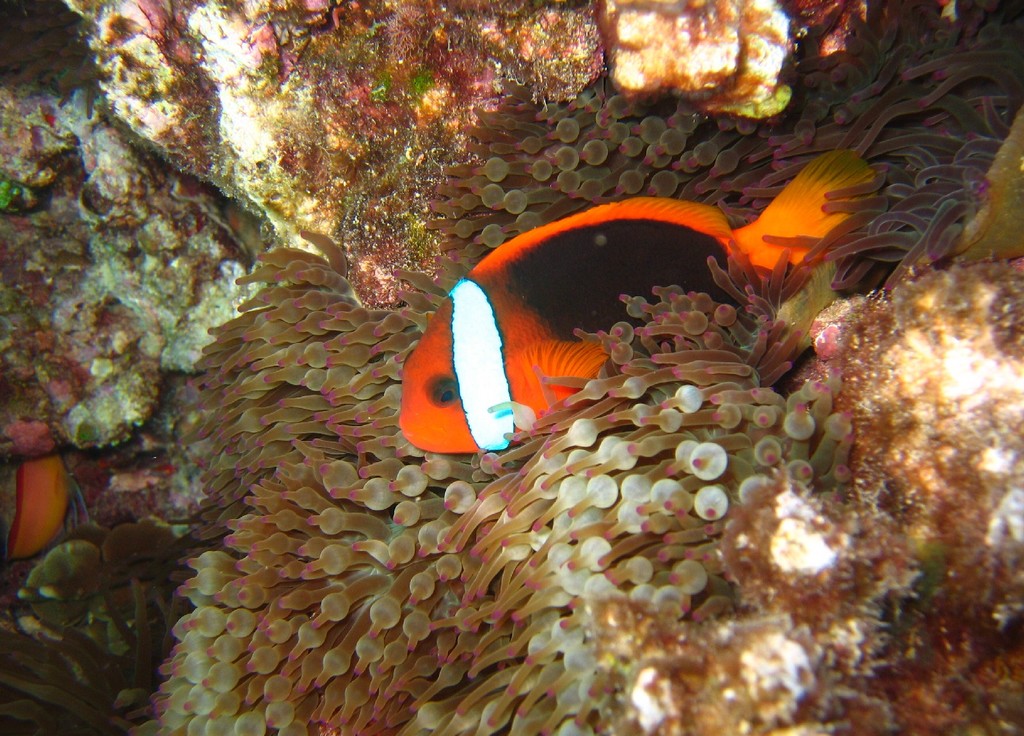
Fire Clownfish (Amphiprion melanopus) and sea anemone, Steve's Bonnie, Ribbon Reefs, Great Barrier Reef, Red Sea: photo by Richard Ling, 11 August 2005
Ocean acidification erodes crucial auditory behaviour in a marine fish (excerpts from a study): by Stephen D. Simpson, with Philip L. Munday, Matthew L. Wittenrich, Rachel Managassa, Danielle L. Dixson, Monica Gagliano and Yong Y. Yan, in Biology Letters, June 2011
*
Richard Black, Environment correspondent, BBC News, 31 May 2011:
Clownfish, the spectacular tropical species feted in the movie Finding Nemo, appear to lose their hearing in water slightly more acidic than normal.
The oceans are becoming more acidic because they absorb much of the CO2 that humanity puts into the atmosphere.
Scientists write in the journal Biology Letters that failing to move away from danger would hurt the fish's survival.
"Avoiding coral reefs during the day is very typical behaviour of fish in open water," said research leader Steve Simpson from the School of Biological Sciences at the UK's Bristol University.
"They do this by monitoring the sounds of animals on the reef, most of which are predators to something just a centimetre in length.
"But sounds are also important for mate detection, pack hunting, foraging -- so if any or all of those capacities are gone, you'd have a very lost fish," he told BBC News.

Beautiful, Tom -- not just the photos (which are more than quite wonderful, of course) but the language and precision of this (alarming) study -- and if the fish all leave, what's left?
ReplyDelete6.1
grey white cloud against top of shadowed
ridge, blue jay landing on redwood fence
in foreground, sound of waves in channel
before left might have been,
those of better known
illusion of depth, flatness,
was become that which
grey white clouds reflected in channel,
shadowed green slope of ridge above it
Steve,
ReplyDeleteOne of the participants in this study, the Australian researcher Danielle Dixson, conducted the complementary study on the olfactory effects on clownfish of ocean acidification. That was published two years ago in Ecology Letters. Equally alarming stuff, now to be taken together with this new work. It is apparent that the clownfish aren't equipped to evolve and adapt in pace with the CO2-enriched permanent-rush-hour lifestyle of the humanoids. They're still caught in the long view millions-of-years-of-evolution lane. The fishes can't hear or smell the dangers any more.
Here's a BBC News report on the 2009 Dixson study:
___
Ocean acidification could cause fish to become "fatally attracted" to their predators, according to scientists.
A team studying the effects of acidification -- caused by dissolved CO2 -- on ocean reefs found that it leaves fish unable to "smell danger".
Young clownfish that were reared in the acidified water became attracted to rather than repelled by the chemical signals released by predatory fish.
The findings were published in the journal Ecology Letters.
Danielle Dixson from James Cook University in Queensland, Australia, led the study.
She and her colleagues tested orange clown fish larvae that were raised in water with the same slightly alkaline pH as their ocean reef habitat, and those raised in more acidic water.
The team released the fish into a "flow chamber" with two water sources flowing in parallel.
One source was taken from tanks containing the clown fishes' natural predators and one was drawn from tanks in which non-predatory fish were swimming.
"The flow rates are identical, so the water won't mix," Ms Dixson explained. "This allows the fish in the chamber to choose which water cue they prefer or dislike."
In the test, the fish reared in normal water avoided the stream of water that their predators had been swimming in. They detected the odour of a predator and swam away from it.
But, Ms Dixson said, fish raised in the more acidic water were strongly attracted to both the predatory and the non-predatory flumes.
The researchers say that their study shows that fish larvae "might exhibit a fatal attraction to predators at CO2 and pH levels that could occur in our oceans by 2100 on a business-as-usual scenario of greenhouse gas emissions".
Smell of danger
Previous studies have shown that fish rely on their sense of smell, or olfaction, to avoid being eaten during the what is known as their settlement process. This is when the recently hatched larvae find a suitable, and safe, place to live.
At this vulnerable juvenile stage, the researchers pointed out, "the ability to detect and avoid predators is one of the most important mechanisms to ensure survival".
Ms Dixson told BBC News: "Ocean acidification has the potential to become a widespread problem and it's unknown how many organisms and ecosystems will cope with the decrease [in] pH.
"This study shows that ocean acidification could lead to an increase in the mortality of larvae."
A very good title for an important, alarming and beautifully presented piece. That being said, although it's not meant to, it makes me feel more hopeless than ever. I guess one thing I can take comfort in is that I'm not a clownfish subject in a biology experiment.
ReplyDeleteCurtis,
ReplyDeleteKnow what you mean. The tanks in the study illustrations look clean and friendly enough, but of course no lovely coral reefs or anemones.
Then again, who knows how long there will be coral reefs or anemones... or clownfish...
If mankind's continued "successful" expansion into the biosphere depends upon exploitation, of space, and of other life forms, we can expect a further degradations at every step of the process.
ReplyDeleteThe end is--will be--our own suffering. Our ability to defer this outcome is only temporary. Energy and food and space are limited. The sooner we come to terms with that, the better.
Fuck on, humanity.
Heard a BBC programme on world food production, projected as halved in the next year. That's a pretty swift rate of reduction. Prices of all the major food staples moving up into the "luxury" zone, forecast. Typhoons, cyclones, agribusiness failures. The comfort zone of deferral may be over, yesterday the new tomorrow.
ReplyDelete